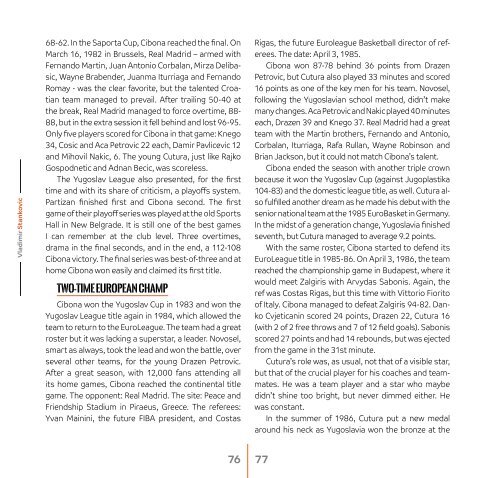101 Greats of European Basketball
You also want an ePaper? Increase the reach of your titles
YUMPU automatically turns print PDFs into web optimized ePapers that Google loves.
Vladimir Stankovic<br />
68-62. In the Saporta Cup, Cibona reached the final. On<br />
March 16, 1982 in Brussels, Real Madrid – armed with<br />
Fernando Martin, Juan Antonio Corbalan, Mirza Delibasic,<br />
Wayne Brabender, Juanma Iturriaga and Fernando<br />
Romay - was the clear favorite, but the talented Croatian<br />
team managed to prevail. After trailing 50-40 at<br />
the break, Real Madrid managed to force overtime, 88-<br />
88, but in the extra session it fell behind and lost 96-95.<br />
Only five players scored for Cibona in that game: Knego<br />
34, Cosic and Aca Petrovic 22 each, Damir Pavlicevic 12<br />
and Mihovil Nakic, 6. The young Cutura, just like Rajko<br />
Gospodnetic and Adnan Becic, was scoreless.<br />
The Yugoslav League also presented, for the first<br />
time and with its share <strong>of</strong> criticism, a play<strong>of</strong>fs system.<br />
Partizan finished first and Cibona second. The first<br />
game <strong>of</strong> their play<strong>of</strong>f series was played at the old Sports<br />
Hall in New Belgrade. It is still one <strong>of</strong> the best games<br />
I can remember at the club level. Three overtimes,<br />
drama in the final seconds, and in the end, a 112-108<br />
Cibona victory. The final series was best-<strong>of</strong>-three and at<br />
home Cibona won easily and claimed its first title.<br />
Two-time <strong>European</strong> champ<br />
Cibona won the Yugoslav Cup in 1983 and won the<br />
Yugoslav League title again in 1984, which allowed the<br />
team to return to the EuroLeague. The team had a great<br />
roster but it was lacking a superstar, a leader. Novosel,<br />
smart as always, took the lead and won the battle, over<br />
several other teams, for the young Drazen Petrovic.<br />
After a great season, with 12,000 fans attending all<br />
its home games, Cibona reached the continental title<br />
game. The opponent: Real Madrid. The site: Peace and<br />
Friendship Stadium in Piraeus, Greece. The referees:<br />
Yvan Mainini, the future FIBA president, and Costas<br />
Rigas, the future Euroleague <strong>Basketball</strong> director <strong>of</strong> referees.<br />
The date: April 3, 1985.<br />
Cibona won 87-78 behind 36 points from Drazen<br />
Petrovic, but Cutura also played 33 minutes and scored<br />
16 points as one <strong>of</strong> the key men for his team. Novosel,<br />
following the Yugoslavian school method, didn’t make<br />
many changes. Aca Petrovic and Nakic played 40 minutes<br />
each, Drazen 39 and Knego 37. Real Madrid had a great<br />
team with the Martin brothers, Fernando and Antonio,<br />
Corbalan, Iturriaga, Rafa Rullan, Wayne Robinson and<br />
Brian Jackson, but it could not match Cibona’s talent.<br />
Cibona ended the season with another triple crown<br />
because it won the Yugoslav Cup (against Jugoplastika<br />
104-83) and the domestic league title, as well. Cutura also<br />
fulfilled another dream as he made his debut with the<br />
senior national team at the 1985 EuroBasket in Germany.<br />
In the midst <strong>of</strong> a generation change, Yugoslavia finished<br />
seventh, but Cutura managed to average 9.2 points.<br />
With the same roster, Cibona started to defend its<br />
EuroLeague title in 1985-86. On April 3, 1986, the team<br />
reached the championship game in Budapest, where it<br />
would meet Zalgiris with Arvydas Sabonis. Again, the<br />
ref was Costas Rigas, but this time with Vittorio Fiorito<br />
<strong>of</strong> Italy. Cibona managed to defeat Zalgiris 94-82. Danko<br />
Cvjeticanin scored 24 points, Drazen 22, Cutura 16<br />
(with 2 <strong>of</strong> 2 free throws and 7 <strong>of</strong> 12 field goals). Sabonis<br />
scored 27 points and had 14 rebounds, but was ejected<br />
from the game in the 31st minute.<br />
Cutura’s role was, as usual, not that <strong>of</strong> a visible star,<br />
but that <strong>of</strong> the crucial player for his coaches and teammates.<br />
He was a team player and a star who maybe<br />
didn’t shine too bright, but never dimmed either. He<br />
was constant.<br />
In the summer <strong>of</strong> 1986, Cutura put a new medal<br />
around his neck as Yugoslavia won the bronze at the<br />
76<br />
77
















